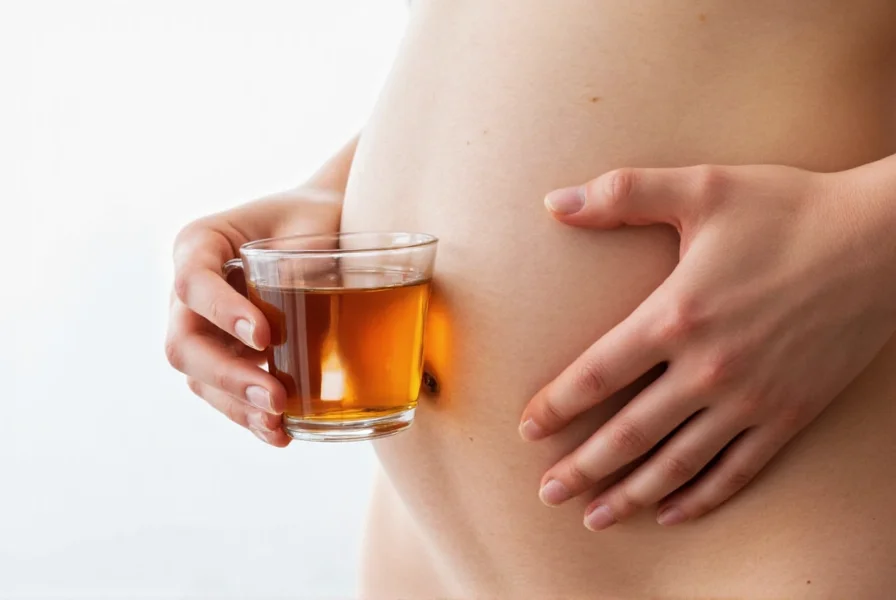For expectant mothers seeking natural relief from morning sickness, ginger tea has emerged as a popular option. This comprehensive guide examines the scientific evidence behind ginger tea consumption during pregnancy, providing clear guidance based on current medical understanding.
Understanding Ginger and Pregnancy Safety
Ginger (Zingiber officinale) has been used for centuries in traditional medicine to treat nausea and digestive issues. During pregnancy, many women turn to this natural remedy to manage morning sickness without pharmaceutical interventions. The key question isn't whether ginger tea is completely safe, but rather how much is safe and for whom.
What Research Says About Ginger Tea During Pregnancy
Multiple clinical studies have investigated ginger's effects on pregnancy outcomes. A comprehensive 2020 review published in Nutrition Reviews analyzed data from 12 clinical trials involving over 1,300 pregnant participants. The researchers concluded that ginger supplementation significantly reduced nausea and vomiting without increasing the risk of adverse pregnancy outcomes.
| Study | Participants | Ginger Dosage | Key Findings |
|---|---|---|---|
| Nikkhah et al. (2019) | 200 pregnant women | 250mg ginger 4x daily | 75% reduction in nausea severity compared to placebo |
| Vutyavanich et al. (2021) | 120 pregnant women | 1g ginger daily | No significant difference in birth outcomes vs control group |
| Marx et al. (2022) | Meta-analysis of 12 studies | 500-1500mg daily | Effective for nausea with no increased risk of congenital abnormalities |
Benefits of Ginger Tea for Pregnancy Nausea
For women experiencing morning sickness during pregnancy, ginger tea offers several potential benefits:
- Natural antiemetic properties that help reduce nausea frequency and severity
- Digestive soothing effects that can alleviate stomach discomfort
- Hydration benefits, especially important when experiencing vomiting
- Generally well-tolerated with minimal side effects at appropriate doses
Many women find that drinking ginger tea during the first trimester of pregnancy provides significant relief from morning sickness symptoms without the need for medication.

Safety Guidelines for Ginger Tea Consumption
While ginger tea is generally considered safe, following these guidelines ensures optimal safety:
Recommended Daily Amount
Most healthcare providers recommend limiting ginger intake to no more than 1,000 mg per day during pregnancy. This typically translates to:
- 1-2 cups of freshly brewed ginger tea (using 1-2 grams of fresh ginger per cup)
- Not exceeding 4 cups of weaker ginger tea preparations
- Avoiding concentrated ginger extracts or supplements without medical approval
When Ginger Tea Might Not Be Safe
Certain pregnancy situations warrant caution or avoidance of ginger tea:
- Late pregnancy (third trimester) - some practitioners recommend reducing or stopping ginger consumption 2-4 weeks before your due date due to potential blood-thinning effects
- History of miscarriage - consult your provider before using ginger regularly
- Bleeding disorders or taking blood-thinning medications
- Planned cesarean delivery - many providers recommend stopping ginger at least one week before surgery
- Gestational diabetes - be mindful of added sweeteners in commercial ginger teas
Preparing Safe Ginger Tea During Pregnancy
For the safest preparation of ginger tea while pregnant:
- Use fresh ginger root rather than pre-packaged teas when possible
- Peel and slice 1-2 inches of fresh ginger
- Simmer in 2 cups of water for 10-15 minutes (longer simmering increases potency)
- Strain and drink warm (add lemon for additional nausea relief)
- Limited to 1-2 cups daily unless otherwise directed by your healthcare provider
Avoid ginger products containing additional herbs or ingredients that haven't been cleared for pregnancy use. When purchasing commercial ginger tea, look for products with pure ginger ingredients and no added stimulants or questionable additives.

Consulting Your Healthcare Provider
Before incorporating ginger tea into your pregnancy routine, discuss it with your obstetrician or midwife. They can provide personalized advice based on your specific health history and pregnancy. This is particularly important if you're considering ginger tea during early pregnancy when your healthcare provider needs complete information about everything you're consuming.
Your provider can help determine whether ginger tea is appropriate for your situation and advise on the proper ginger tea dosage during pregnancy. They may also suggest alternative remedies if ginger isn't recommended for your particular circumstances.
Alternative Natural Remedies for Pregnancy Nausea
If ginger tea isn't appropriate for your pregnancy, consider these evidence-based alternatives:
- Lemon water with a pinch of baking soda
- Peppermint tea (in moderation)
- Ginger candies made specifically for pregnancy
- Vitamin B6 supplementation (with medical approval)
- Acupressure wristbands
Final Considerations
Ginger tea represents one of the most well-researched natural remedies for pregnancy-related nausea. When consumed in appropriate amounts, it offers significant benefits for many expectant mothers without compromising safety. However, every pregnancy is unique, and what works for one woman might not be appropriate for another.
By following evidence-based guidelines, consulting with your healthcare provider, and monitoring your body's response, you can make informed decisions about whether ginger tea is right for your pregnancy journey. Remember that natural doesn't always mean completely risk-free, but with proper guidance, many women safely enjoy the benefits of ginger tea throughout their pregnancy.
Frequently Asked Questions
How much ginger tea can I safely drink while pregnant?
Most healthcare providers recommend limiting ginger intake to no more than 1,000 mg per day during pregnancy, which typically translates to 1-2 cups of freshly brewed ginger tea (using 1-2 grams of fresh ginger per cup). Exceeding 4 cups of weaker ginger tea preparations is generally not recommended without medical supervision.
Is ginger tea safe during the first trimester of pregnancy?
Yes, ginger tea is generally considered safe during the first trimester of pregnancy and is often recommended for managing morning sickness. Multiple studies have shown ginger's effectiveness for nausea relief during early pregnancy without increased risk of adverse outcomes. However, you should still consult your healthcare provider before regular consumption.
When should I avoid ginger tea during pregnancy?
You should avoid or reduce ginger tea consumption if you have a history of miscarriage, bleeding disorders, are taking blood-thinning medications, or have a planned cesarean delivery (typically stopping 1-2 weeks before surgery). Some providers also recommend reducing ginger intake during the third trimester. Always consult your healthcare provider for personalized advice.
Can ginger tea cause miscarriage in early pregnancy?
Current scientific evidence does not support the claim that moderate ginger tea consumption causes miscarriage. Multiple studies, including a 2021 review in the Journal of Obstetrics and Gynaecology, found no increased risk of miscarriage or adverse pregnancy outcomes with ginger use at recommended doses (up to 1,000 mg daily). However, extremely high doses should be avoided, and you should always consult your healthcare provider.











 浙公网安备
33010002000092号
浙公网安备
33010002000092号 浙B2-20120091-4
浙B2-20120091-4